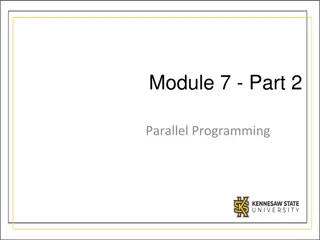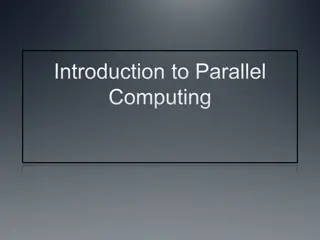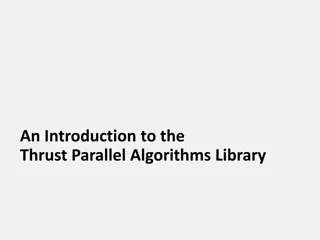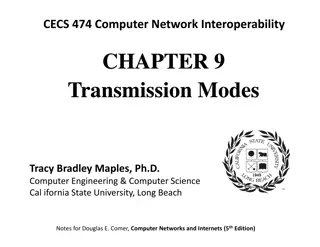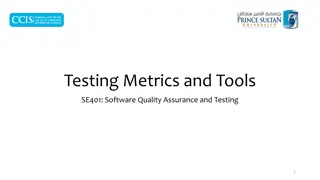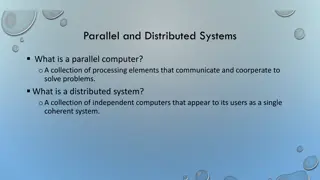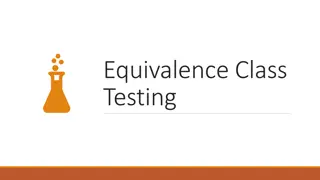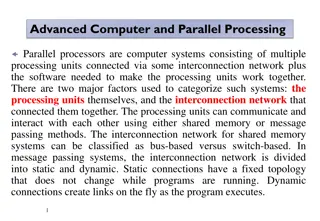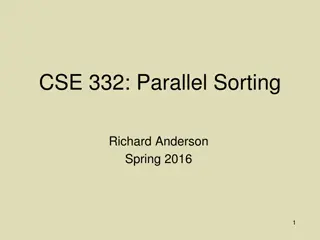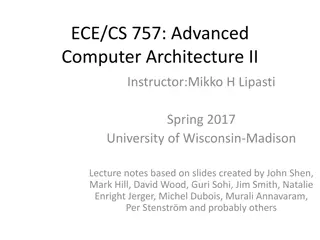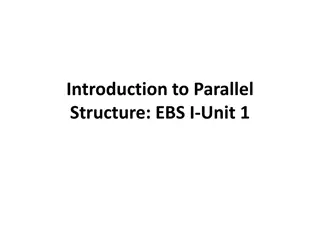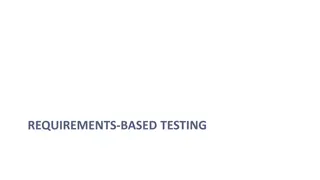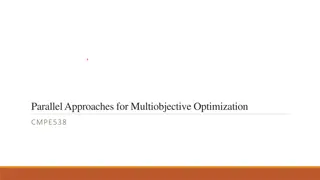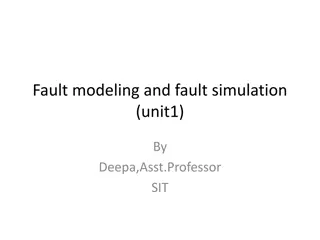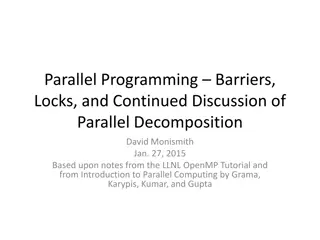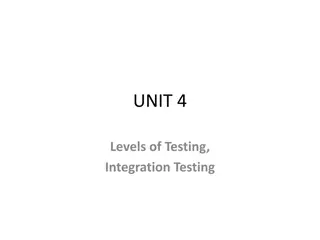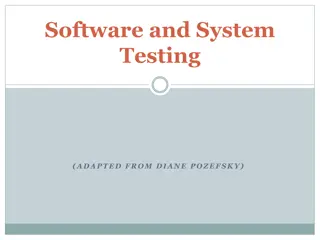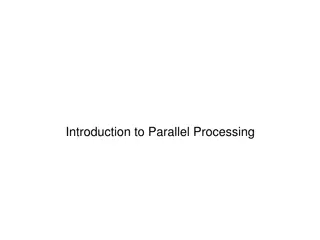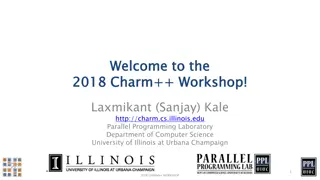Evolution of Parallel Programming in Computing
Moores Law predicted the doubling of transistor capacity every two years, benefitting software developers initially. However, hardware advancements can no longer ensure consistent performance gains. Parallel computing, leveraging multicore architecture, has emerged as a solution to optimize performa
7 views • 10 slides
Understanding 4-Bit Parallel Adder/Subtractor IC7483
Explore the concept of 4-bit parallel adder/subtractor using IC7483, which is a digital circuit capable of performing arithmetic operations on binary numbers greater than one bit in length. Learn about the structure, operation, and implementation of parallel adders with cascaded full adders. Discove
8 views • 11 slides
Exploring Parallel Computing: Concepts and Applications
Dive into the world of parallel computing with an engaging analogy of picking apples, relating different types of parallelism. Learn about task and data decomposition, software models, hardware architectures, and challenges in utilizing parallelism. Discover the potential of completing multiple part
0 views • 27 slides
Understanding Parallel and Distributed Computing Systems
In parallel computing, processing elements collaborate to solve problems, while distributed systems appear as a single coherent system to users, made up of independent computers. Contemporary computing systems like mobile devices, IoT devices, and high-end gaming computers incorporate parallel and d
1 views • 11 slides
Introduction to Thrust Parallel Algorithms Library
Thrust is a high-level parallel algorithms library, providing a performance-portable abstraction layer for programming with CUDA. It offers ease of use, distributed with the CUDA Toolkit, and features like host_vector, device_vector, algorithm selection, and memory management. With a large set of al
0 views • 18 slides
Understanding Transmission Modes in Computer Networks
Transmission modes in computer networks can be divided into serial and parallel modes. Parallel transmission allows multiple bits to be sent simultaneously over separate media, while serial transmission sends one bit at a time. The choice between serial and parallel transmission depends on factors s
0 views • 13 slides
Understanding Software Testing Metrics and Tools
Software testing metrics play a crucial role in evaluating the quality and progress of the testing process. Metrics provide valuable insights into the readiness, quality, and completeness of a product. By measuring attributes such as defects, testing efficiency, and productivity, organizations can m
3 views • 100 slides
Parallel Implementation of Multivariate Empirical Mode Decomposition on GPU
Empirical Mode Decomposition (EMD) is a signal processing technique used for separating different oscillation modes in a time series signal. This paper explores the parallel implementation of Multivariate Empirical Mode Decomposition (MEMD) on GPU, discussing numerical steps, implementation details,
1 views • 15 slides
Understanding Parallel and Distributed Systems in Computing
A parallel computer is a collection of processing elements that collaborate to solve problems, while a distributed system comprises independent computers appearing as a single system. Contemporary computing systems, like mobile devices and cloud platforms, utilize parallel and distributed architectu
0 views • 11 slides
Fundamentals of Software Testing Explained
Software testing is a critical process to ensure that software applications meet requirements and are free of defects. It involves various activities such as test planning, analysis, design, implementation, and execution. Testing approaches like the Bing bang approach and Total Quality Management ar
1 views • 48 slides
Understanding Coordinating Conjunctions and Parallel Structure
Coordinating conjunctions like "and," "but," "or," and "nor" are used to connect words or phrases with similar grammatical functions. This creates parallel structure in sentences, ensuring clarity and cohesion. Using examples, the concept of parallel structure with coordinating conjunctions is expla
0 views • 19 slides
Understanding Parallel and Perpendicular Lines
Students will learn to identify and write equations of parallel and perpendicular lines by understanding the relationship between slopes. Parallel lines have the same slope, while perpendicular lines intersect to form right angles. Through examples and explanations, students will gain the skills to
0 views • 12 slides
Understanding Equivalence Class Testing and Its Application in Software Testing
Equivalence class testing is a software testing technique that involves dividing input values into classes for effective testing coverage. Equivalence classes are defined mathematically as subsets of a given set, ensuring partitioning and mutual exclusivity. By applying equivalence partitioning, tes
1 views • 21 slides
Uganda's Successes in Reaching Men with HIV Testing Through Assisted Partner Notification Program
Uganda has successfully implemented an Assisted Partner Notification (APN) program to reach men for HIV testing, addressing the gender gap in testing rates. By utilizing various approaches such as index testing, self-testing, and social network testing, Uganda has achieved significant success in tar
0 views • 12 slides
Parallel Processing and SIMD Architecture Overview
Parallel processors in advanced computer systems utilize multiple processing units connected through an interconnection network. This enables communication via shared memory or message passing methods. Multiprocessors offer increased speed and cost-effectiveness compared to single-processor systems
3 views • 24 slides
Parallel Chi-square Test for Feature Selection in Categorical Data
The chi-square test is a popular method for feature selection in categorical data with classification labels. By calculating chi-square values in parallel for all features simultaneously, this approach provides a more efficient solution compared to serial computation. The process involves creating c
1 views • 4 slides
Software Testing Foundation Level: Testing Throughout the SDLC Quiz
Explore key concepts in software testing throughout the Software Development Lifecycle (SDLC) with a quiz covering topics like white-box testing in acceptance testing, component testing vs. system testing, and regression testing purposes. Enhance your understanding of testing methodologies with samp
5 views • 17 slides
Importance of Software Testing in Preventing Catastrophic Failures
Software testing is crucial in ensuring the reliability and safety of software systems, as highlighted by catastrophic failures such as the Ariane 5 rocket incident and the Therac-25 radiation therapy machine disasters. These examples underscore the importance of thorough testing in identifying and
1 views • 42 slides
Understanding Shift Registers: Introduction and Classification
Explore the world of shift registers, including buffer registers, and different modes of operation like serial in/serial out, serial in/parallel out, parallel in/serial out, and parallel in/parallel out. Learn about the construction, operation, and classification of registers in digital systems.
1 views • 24 slides
Understanding Shift Registers in Sequential Logic Circuits
Shift registers are sequential logic circuits used for storing digital data. They consist of interconnected flip-flops that shift data in a controlled manner. This article explores different types of shift registers such as Serial In - Serial Out, Serial In - Parallel Out, Parallel In - Serial Out,
2 views • 9 slides
Testing Approach in SCREAM for E3SM Fall All-Hands 2019
Major effort is focused on verification and testing in SCREAM for the E3SM Fall All-Hands. The initiative includes unit testing, property testing, regression testing, and leveraging various tools like Cmake, Python, Jenkins, AutoTester, and GitHub for Continuous Integration (CI). The emphasis is on
1 views • 21 slides
Understanding Parallel Circuits in Electronics
Explore topics such as resistors in parallel, voltage distribution, Kirchhoff's current law, resistance calculations, and practical applications in parallel circuits. Dive into problem-solving exercises and grasp concepts like current dividers, total resistance calculations, and power distribution i
0 views • 20 slides
Enhancing Internet Backbone Performance through Parallel Resolution of Packets and Rules
The bottleneck in Internet backbones lies in the decision-making process for incoming packets. This article explores the challenges faced in efficiently processing policies in routers and middleboxes by introducing parallel resolution techniques to increase throughput and reduce latency. It discusse
0 views • 22 slides
Understanding Parallel Sorting Algorithms and Amdahl's Law
Exploring the concepts of parallel sorting algorithms, analyzing parallel programs, divide and conquer algorithms, parallel speed-up, estimating running time on multiple processors, and understanding Amdahl's Law in parallel computing. The content covers key measures of run-time, divide and conquer
1 views • 40 slides
Understanding Testing in Software Engineering
In the previous session, we discussed various aspects of software engineering, including modeling with UML diagrams, such as activity diagrams, use case diagrams, sequence diagrams, state diagrams, and class diagrams, as well as architecture patterns. Testing was emphasized as a key aspect, highligh
0 views • 35 slides
Parallel Programming Directives and Concepts
Learn about parallel programming directives like Diretiva.parallel and #pragma omp.parallel, which allow code to be executed by multiple threads simultaneously. Explore concepts such as defining parallel regions, setting the number of threads, and utilizing OpenMP directives for parallel for loops.
0 views • 39 slides
Understanding Gray Box Testing in Software Development
Gray Box Testing is a software testing technique that involves testing the software with partial knowledge of its internal workings. It combines aspects of White Box Testing and Black Box Testing, allowing testers to check both the presentation layer and the code part of an application. Gray Box Tes
0 views • 14 slides
Understanding Parallel Software in Advanced Computer Architecture II
Exploring the challenges of parallel software, the lecture delves into identifying and expressing parallelism, utilizing parallel hardware effectively, and debugging parallel algorithms. It discusses functional parallelism, automatic extraction of parallelism, and finding parallelism in various appl
0 views • 86 slides
Mastering Parallel Structure in Business Communication
Understanding and implementing parallel structure in business communication is essential for clear, effective, and professional writing. Explore the nuances of parallelism, such as using correlative conjunctions like "not only...but also," to ensure consistency and coherence in your written work. Le
0 views • 21 slides
Understanding Requirements-Based Testing in Software Development
Dive into the world of requirements-based testing in software development, exploring main concepts, test levels, testing roles, and the importance of testing your solution and modeling case. Learn about test cases, different testing activities, and the significance of acceptance testing in identifyi
0 views • 16 slides
Implementing Parallel Testing Labs for Quality Control in Life Science Projects
Implementing parallel testing labs for quality control in life science projects involves creating new LJ charts, utilizing the right control charts, understanding how Statistical Quality Control (SQC) works, evaluating QC with a stable analytical system, and conducting parallel testing to ensure the
0 views • 17 slides
Guidelines for HIV Testing During Pregnancy and Postpartum
These guidelines recommend HIV testing during pregnancy, at delivery, and postpartum. Testing should be done early in pregnancy and again in the third trimester. Expedited testing during labor is required for certain patients, and syphilis testing is recommended. Pre-exposure and post-exposure proph
0 views • 18 slides
Parallel Approaches for Multiobjective Optimization in CMPE538
This lecture provides a comprehensive overview of parallel approaches for multiobjective optimization in CMPE538. It discusses the design and implementation aspects of algorithms on various parallel and distributed architectures. Multiobjective optimization problems, often NP-hard and time-consuming
0 views • 20 slides
Comprehensive Overview of Fault Modeling and Fault Simulation in VLSI
Explore the intricacies of fault modeling and fault simulation in VLSI design, covering topics such as testing philosophy, role of testing in VLSI, technology trends affecting testing, fault types, fault equivalence, dominance, collapsing, and simulation methods. Understand the importance of testing
0 views • 59 slides
Understanding Unit Testing in Software Engineering
Concept Software is a discipline comprising various code pieces. Testing these codes together is complex but vital in Software Engineering. The process includes early testing like unit tests, pairwise/multiple component testing, module testing, integration testing, user tests, alpha tests, beta test
1 views • 6 slides
Understanding OpenMP Barriers and Locks in Parallel Programming
Exploring the concepts of OpenMP barriers and locks in parallel programming, this discussion covers the importance of synchronization through barriers, the use of lock variables for finer control over synchronization, and examples like the Dining Philosophers problem. Learn how these primitives faci
0 views • 22 slides
Understanding Integration Testing and Levels of Testing
Explore the importance of integration testing in software development, covering topics such as traditional testing levels, the SATM system, goals and purposes of integration testing, testing level assumptions and objectives, software process overview, various approaches to integration testing, and t
0 views • 39 slides
Importance of Software and System Testing
Understanding the critical role of software and system testing in identifying and fixing errors before they lead to major failures. Various types of testing such as functional, usability, performance, and reliability testing are essential to ensure the quality of software products. Different classif
0 views • 52 slides
Understanding Parallel Processing Fundamentals
This overview delves into the basics of parallel computing, covering parallel memory architectures, programming models, design issues, and parallelizing serial programs. Parallel computing involves leveraging multiple compute resources simultaneously to enhance computational efficiency and solve pro
0 views • 35 slides
Introduction to Charm++ Programming Framework
Charm++ is a generalized approach to parallel programming that offers an alternative to traditional parallel programming languages like MPI, UPC, and GA. It emphasizes overdecomposition, migratability, and asynchrony to enhance parallel program performance and efficiency. The framework uses indexed
0 views • 43 slides
